Physical Address
304 North Cardinal St.
Dorchester Center, MA 02124
Physical Address
304 North Cardinal St.
Dorchester Center, MA 02124

Transform your Welsh camping experience by pitching near vibrant villages where ancient pubs and local secrets await discovery.
You’ll discover that Welsh villages aren’t just postcard-pretty stopovers—they’re living communities where camping becomes something entirely different. Instead of isolating yourself in remote fields, you can pitch your tent within walking distance of centuries-old pubs, local markets, and festivals that most travelers never experience. The real magic happens when village locals start sharing their favorite hiking routes and you realize you’re not just visiting Wales anymore.
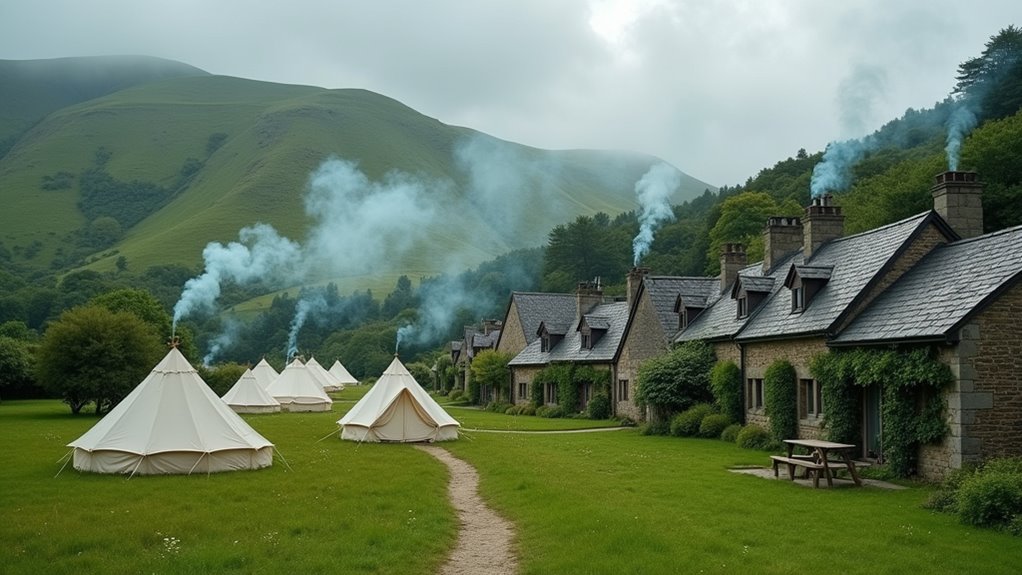
When you’re looking to blend affordable camping with genuine Welsh culture, certain villages stand out for their welcoming communities and camper-friendly amenities.
Betws-y-Coed offers budget-friendly campsites within walking distance of local pubs where you’ll chat with friendly locals. The village hosts regular community events that welcome visitors.
Hay-on-Wye combines literary culture with practical camping facilities. You’ll find reasonably priced sites near the famous bookshops, plus locals who’ll share hiking recommendations over coffee.
Llangollen provides riverside camping with easy village access. The community center runs affordable evening activities, and you’ll discover genuine Welsh hospitality in family-run establishments.
Machynlleth offers eco-conscious camping options alongside its alternative community vibe. You’ll connect with like-minded travelers and locals committed to sustainable living while keeping costs low. Remember that camping safely with your four-legged companions requires special preparation, so research dog-friendly accommodations and local pet policies before booking your Welsh village adventure.
While most travelers rush through Snowdonia’s gateway villages, you’ll find these mountain settlements offer the perfect blend of epic hiking and authentic pub culture without breaking your budget.
Skip the tourist traps and discover Snowdonia’s hidden villages where epic trails meet cozy pubs and budget-friendly adventure awaits.
Betws-y-Coed provides easy access to Snowdon’s trails while maintaining affordable camping options and welcoming locals at Y Stablau pub.
Capel Curig sits perfectly positioned for mountain adventures, with the Pinnacle Café doubling as your evening social hub where climbers swap stories over reasonably priced pints.
You’ll discover Llanberis offers the most bang for your buck—camp near Llyn Padarn, tackle Snowdon via the railway path, then celebrate at Pete’s Eats where hearty meals won’t drain your wallet.
These villages understand outdoor enthusiasts need both mountain access and genuine community connections after long hiking days.
Summer camping in these Welsh mountains requires hot-weather preparation to stay comfortable during peak hiking season when temperatures can soar unexpectedly.
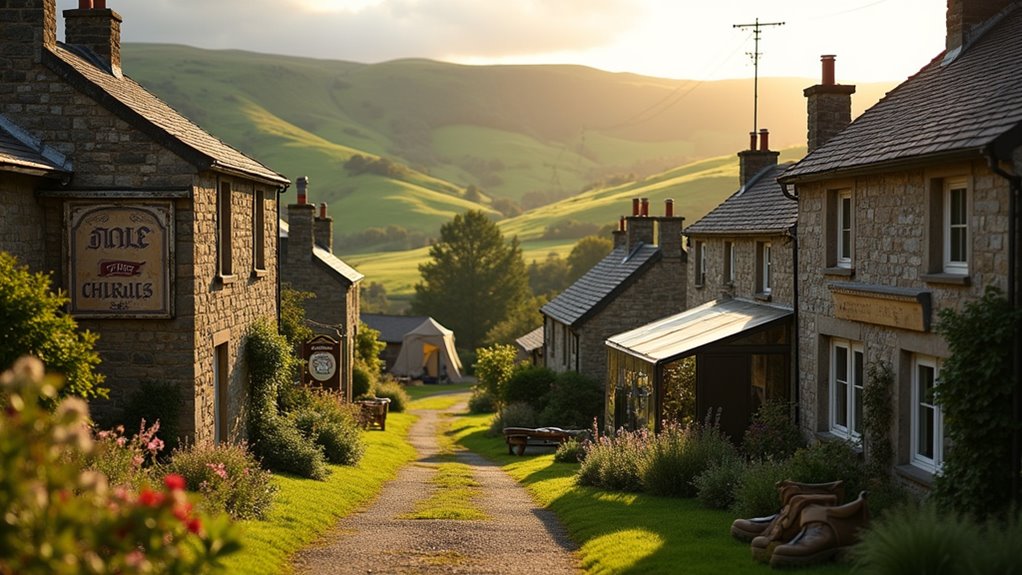
Unlike Snowdonia’s dramatic peaks, the Brecon Beacons reward you with gentler adventures and some of Wales’ most budget-friendly village camping experiences.
You’ll find perfect base camps in villages like Crickhowell and Hay-on-Wye, where farm campsites charge around £8-12 per night. The rolling landscape makes hiking accessible for all fitness levels, while village pubs offer hearty meals that won’t drain your wallet.
Your camping experience here combines three essentials:
The Beacons’ villages excel at genuine hospitality. You’ll chat with farmers at morning markets, join locals in cozy pubs, and discover why this region attracts campers seeking authentic Welsh countryside without Snowdonia’s crowds or prices. For those seeking more extreme outdoor adventures, the US offers exceptional glacier climbing opportunities in locations like Alaska and the Pacific Northwest.
Although Pembrokeshire’s coastal path attracts thousands of hikers annually, the peninsula’s fishing villages offer something special: seaside camping that doesn’t cost a fortune.
You’ll find excellent value at village campsites in Little Haven, Broad Haven, and Porthgain, where pitches cost £15-25 per night compared to £40+ at coastal resorts.
These working harbors maintain their authentic character. You can buy fresh crab from fishermen in Porthgain or join locals at clifftop pubs overlooking dramatic coastlines.
Village shops stock camping essentials without tourist markup, and you’re steps from secluded coves perfect for wild swimming.
Book early for summer spots, especially near St. David’s. Many sites offer basic facilities but spectacular cliff-edge locations that’ll make you forget about luxury amenities.
For fishing enthusiasts, consider whether renting or buying a small boat makes sense for exploring the coastal waters during your stay.
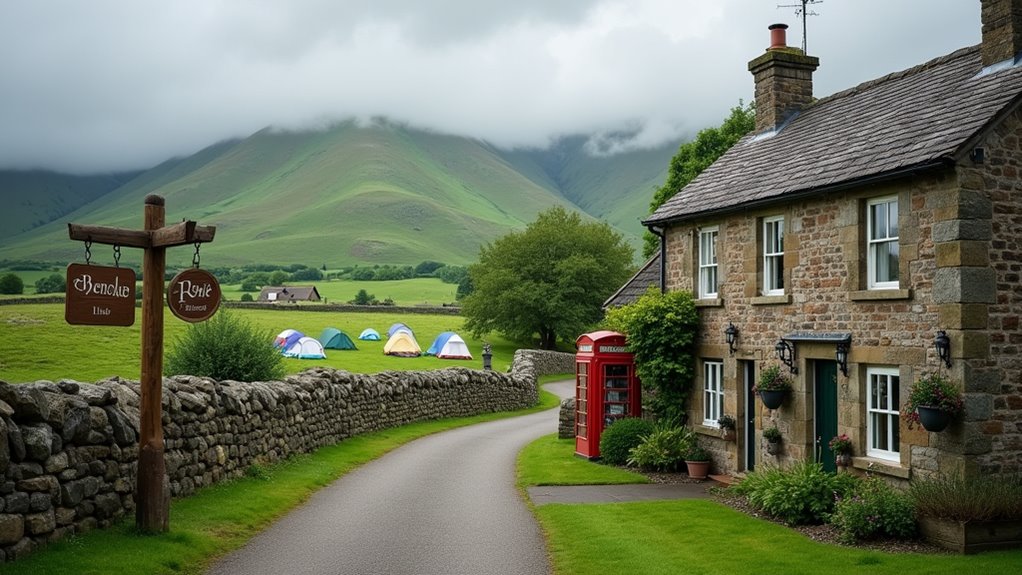
Once you’ve chosen your Welsh village campsite, you’ll want to map out the local amenities that can make or break your camping experience. Most Welsh villages offer essential services within walking distance, saving you fuel costs and enhancing your connection to local life.
Smart campers know that the best Welsh village experiences happen when essential amenities are just a short stroll from your tent.
Key amenities to locate first:
You’ll also want to identify the nearest pharmacy, cash machine, and mobile phone signal spots. These practical considerations guarantee you’re prepared for any situation while keeping costs down. Learning essential camping hacks before your trip will help you make the most of these village amenities and ensure you’re ready for any unexpected situations.
When you time your camping trip around Wales’ vibrant festival calendar, you’ll witness centuries-old traditions that transform quiet villages into bustling celebrations. Eisteddfodau showcase Welsh poetry, music, and dance competitions throughout summer months—many villages host free outdoor performances perfect for campers on tight budgets.
May Day celebrations feature traditional Morris dancing and maypole festivities in village squares. During autumn, harvest festivals offer locally-grown produce at bargain prices, ideal for stocking your camp kitchen.
Winter brings Mari Lwyd processions, where costumed locals carry horse skulls door-to-door singing traditional songs.
St. David’s Day (March 1st) transforms every Welsh village with parades, Welsh cake tastings, and folk music. Most events are free or charge minimal entry fees, making them budget-friendly entertainment that’ll enrich your camping experience with authentic Welsh culture. For those seeking even more dramatic landscapes during their Welsh adventures, consider exploring the Adventure of the Andes for your next international camping expedition.
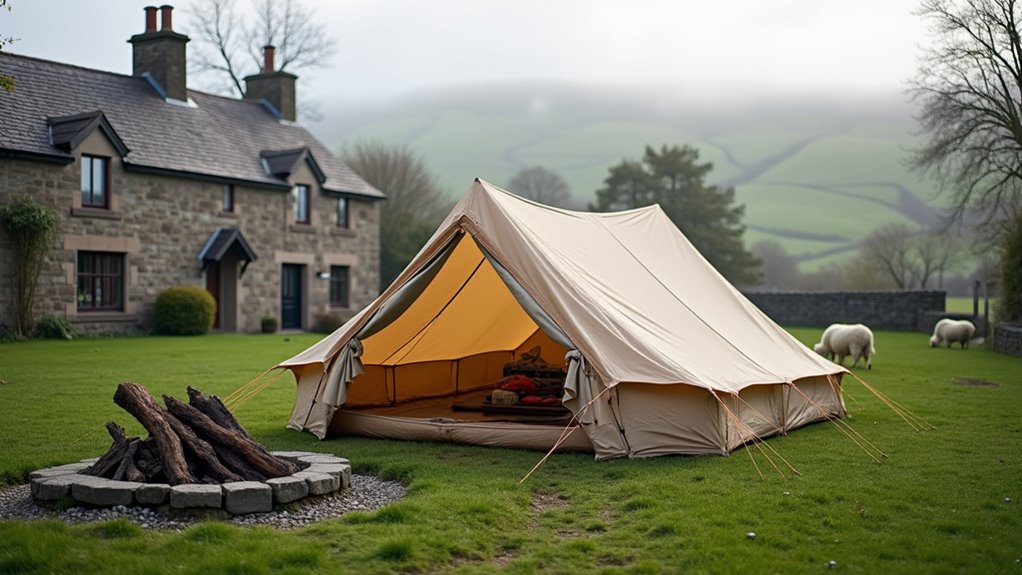
Participating in these local celebrations requires understanding the unwritten social rules that govern Welsh village life. You’ll find that respecting these customs enhances your camping experience while building genuine connections with locals.
Here’s how to navigate village interactions respectfully:
Remember that many villages operate on slower rhythms than city life. Don’t rush conversations or expect immediate service.
Welsh hospitality is legendary, but it’s earned through patience and genuine interest in the community you’re visiting. Following proper camping etiquette ensures you remain a welcome visitor while respecting both the local community and the natural environment around you.
After you’ve mastered village etiquette, you’ll discover that Wales’ culinary landscape offers camping visitors incredible value through its network of farm shops, local markets, and traditional inns.
You’ll find farm shops selling fresh produce, homemade preserves, and local cheeses at prices that beat supermarkets. Many farmers offer eggs, milk, and seasonal vegetables directly from their gates.
Village pubs serve hearty meals using local ingredients, often cheaper than chain restaurants. Look for daily specials featuring Welsh lamb, beef, and fresh fish.
Most inns welcome muddy boots and camping gear, creating relaxed dining experiences.
Weekly farmers’ markets provide excellent opportunities to stock your camping supplies while supporting local producers.
You’ll taste authentic Welsh specialties like bara brith, cawl, and locally brewed ales.
When exploring remote areas for fresh spring water, always carry a camping water filter to ensure safe drinking water during your countryside adventures.
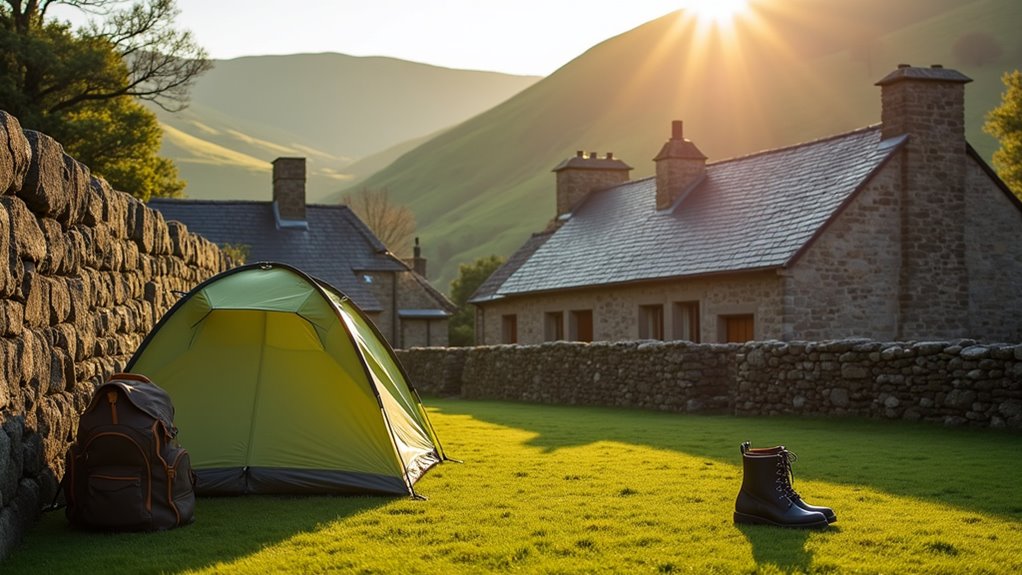
Where should you begin mapping your village-hopping camping route across Wales? Start by identifying villages with nearby campsites or wild camping opportunities within walking distance. You’ll want to balance accessibility with authentic Welsh charm.
Consider these proven routes for budget-conscious adventurers:
Book campsites early during summer months, but don’t over-plan. Leave flexibility for spontaneous discoveries.
Download offline maps, pack light, and research local bus connections between villages to reduce driving costs. For those seeking an even lighter camping experience, lightweight tent trailers offer an excellent compromise between comfort and portability for village-to-village travel.
You’ll discover that escaping the hustle of modern life doesn’t require expensive retreats or fancy glamping pods. Instead, you’ll find authentic connection by pitching a basic tent near Wales’ most unassuming villages. While others chase Instagram-worthy destinations, you’re building genuine friendships over shared campfire stories and village pub conversations. The irony? The simplest camping approach delivers the richest cultural experience, proving that sometimes stepping backward actually moves you forward.